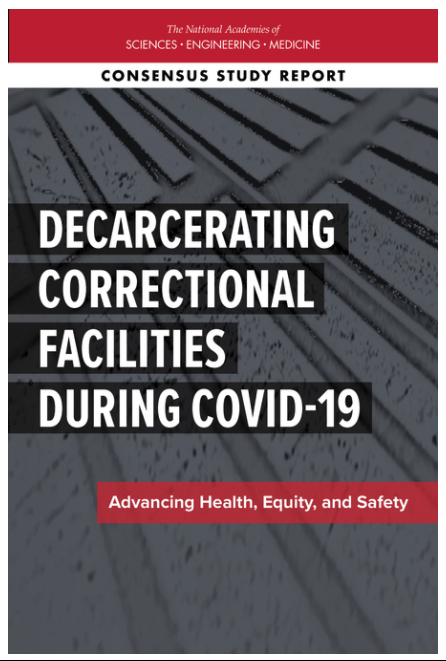On October 20, 2020, the National Academies of Sciences, Engineering, and Medicine (NASEM) released a new study entitled Decarcerating Correctional Facilities During COVID-19: Advancing Health, Equity, and Safety.
The NASEM committee report, co-chaired by Justice Lab Co-Director Bruce Western, cautions policymakers, corrections leaders, and public health officials to ramp up decarceration efforts in order to mitigate the continuing threat of COVID-19. The report also recommends enacting policies to ensure adequate health care and social supports for released individuals and their families. Without such reentry supports, the NASEM committee warns that efforts to decarcerate during the COVID-19 pandemic will fall short of achieving their full potential.
The report was also co-chaired by Yale School of Medicine Professor Emily Wang and authored by a diverse committee of experts from the medical, scientific, academic, policy, corrections, and advocacy fields.
Other key findings and recommendations from the report include:
- As of August 2020, COVID-19 case rates among incarcerated people were nearly five times higher than in the general population, and three times higher among correctional staff. The very nature of correctional and immigration detention settings — overcrowding, poor sanitary conditions, and inadequate public health practices — increases the risk of those facilities becoming COVID-19 hotspots.
- In Black and Hispanic communities, the effects of disproportionate incarceration are now compounded by the increased risk of COVID-19 complications. This is due to a higher prevalence of underlying health conditions that are often undertreated because of structural disadvantages and discrimination.
- The extent of decarceration so far is insufficient to reduce the risk of COVID-19 transmission in correctional facilities across the nation. Law enforcement and other criminal justice officials can accelerate decarceration by: (1) issuing citations instead of making arrests; (2) releasing more defendants before trial instead of setting bail; (3) eliminating incarceration for misdemeanors, probation and parole violations, or a failure to pay fines and fees; and (4) updating compassionate release policies to allow medical vulnerability as a reason for release.
- Successful decarceration during a pandemic must go beyond the criminal justice system and include providing reentry supports. This requires removing barriers to eligibility for Medicaid, eliminating criminal record-based bans on eligibility for food stamps, public assistance, housing benefits, and other federal programs, and removing work requirements for those who can’t find jobs.
- Correctional systems must standardize, define, and release their COVID-19 related data — including how decarceration strategies will be implemented and who will benefit from them. At the moment, a majority of jails aren’t reporting COVID-19 information, and systematic data about ICE detention centers or juvenile facilities is unavailable.
Read the full report HERE.
